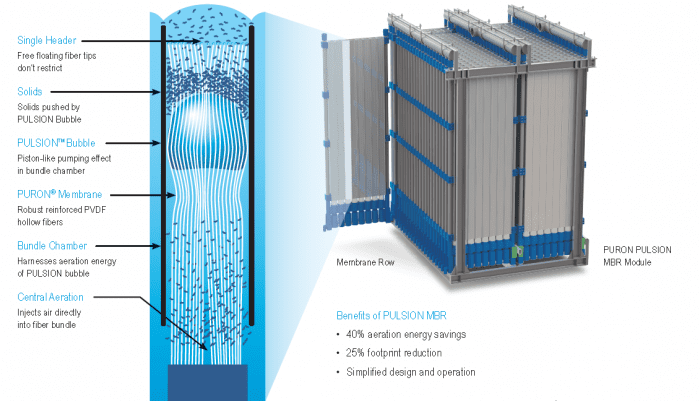The Benefits of Membrane Bioreactors in Sustainable Wastewater Monitoring
Membrane layer bioreactors (MBRs) represent a critical improvement in lasting wastewater monitoring, efficiently combining biological therapy with advanced membrane purification innovation. As the need for lasting solutions escalates, discovering the complex advantages of MBRs may expose unexpected effects for the future of wastewater therapy systems.
Introduction of Membrane Bioreactors
Membrane bioreactors (MBRs) represent a considerable innovation in wastewater therapy innovation, integrating biological destruction with membrane layer purification to enhance the performance of the treatment procedure. This innovative system incorporates the benefits of standard activated sludge procedures with membrane layer modern technology, permitting enhanced solid-liquid splitting up. MBRs utilize semi-permeable membrane layers to separate cured water from biomass, resulting in top notch effluent that can be reused or securely discharged right into the environment.
The operational layout of MBRs usually involves a bioreactor where bacteria break down natural matter, adhered to by a membrane system that filters the blended liquor. This configuration not just lessens the impact of the therapy center however likewise enables greater biomass focus and reduced hydraulic retention times. Moreover, MBRs can treating a larger range of contaminants, consisting of pathogens and nutrients, making them suitable for various applications, from metropolitan wastewater treatment to industrial effluent processing.
The assimilation of MBRs into wastewater monitoring systems is a sign of an expanding trend towards sustainable and reliable techniques in environmental design. Their capability to create high-grade effluent while decreasing space demands settings MBR modern technology as a key player in modern wastewater therapy services.
Boosted Effluent Quality

The membrane layer filtration procedure serves as a physical obstacle, enabling the retention of microorganisms and particle issue, which contributes to a clearer and cleaner effluent (Membrane Bioreactor). MBRs run at higher biomass concentrations than traditional activated sludge systems, advertising a lot more effective biodegradation of contaminants. This brings about a reduction in biochemical oxygen need (BOD) and total put on hold solids (TSS) levels in the final effluent
Additionally, MBRs demonstrate excellent efficiency in treating tough wastewater compositions, such as industrial effluents and wastewater with high nutrient lots. Therefore, the effluent produced is typically of greater high quality, enabling for even more flexible disposal alternatives and minimized environmental effect. Eventually, the enhanced effluent high quality attained with MBR modern technology highlights its crucial role in advancing sustainable wastewater administration methods.
Water Reuse Opportunities
The top quality effluent created by membrane bioreactors (MBRs) opens substantial opportunities for water reuse in various applications. MBRs effectively remove contaminants, consisting of pathogens, put on hold solids, and organic issue, resulting in cured water that meets or Home Page exceeds governing requirements for reuse. This top quality allows for the application of water recycling initiatives across diverse industries.
One popular application is in agriculture, where dealt with wastewater can be made use of for watering, promoting sustainable farming practices while preserving freshwater sources. Furthermore, MBR-treated effluent can be made use of for industrial procedures such as cooling, cleaning, and as a procedure water source, significantly lowering the need for drinkable water in these operations.
In urban environments, MBRs promote using reclaimed water for landscape watering, commode flushing, and various other non-potable usages, adding to the overall durability of water system systems. Additionally, the integration of MBR innovation in decentralized systems help in taking care of localized water needs, specifically in click resources water-scarce regions.
Decreased Environmental Influence
How can the fostering of membrane layer bioreactors (MBRs) contribute to a decreased ecological impact in wastewater management? MBRs substantially boost the treatment efficiency of wastewater while lessening ecological disturbances. Membrane Bioreactor.
Moreover, MBRs operate at reduced hydraulic retention times compared to conventional systems, leading to smaller treatment plant footprints. This small layout lowers land use, thus preserving natural environments and biodiversity. The procedure additionally produces much less sludge than conventional approaches, alleviating disposal obstacles and lowering greenhouse gas emissions connected with sludge monitoring.
In addition, MBRs assist in the recuperation of beneficial sources, such as water and nutrients, adding to a round economic climate. By allowing water reuse for irrigation or industrial processes, MBRs assist minimize more info here freshwater shortage, therefore promoting sustainable water utilize techniques. Eventually, the fostering of MBR technology represents a substantial stride in the direction of minimizing the environmental effect of wastewater management systems.
Economic Advantages of MBRs

Furthermore, MBRs facilitate the manufacturing of top notch effluent, which can be recycled for numerous applications, such as agricultural watering and industrial procedures - Membrane Bioreactor. This reuse capability can substantially reduce water procurement expenses, giving an economic motivation for industries dealing with rigid water guidelines
The compact style of MBR systems also results in minimized land demands, which is especially beneficial in metropolitan areas where real estate is expensive. By minimizing room, markets and communities can minimize land purchase and upkeep expenses.
Furthermore, MBRs often call for much less constant maintenance and have a longer life-span than typical systems, better adding to cost savings. In summary, the financial advantages of MBRs-- ranging from reduced functional expenses to land cost savings and effluent reuse-- make them an engaging option for sustainable wastewater monitoring, supplying both immediate and long-lasting economic advantages.
Final Thought
Additionally, MBRs add to minimized environmental effects via compact designs and reduced sludge generation. Economic benefits further enhance their viability, making MBRs a promising remedy for attending to the obstacles of wastewater treatment and advertising lasting source management.
Membrane bioreactors (MBRs) stand for a pivotal improvement in lasting wastewater administration, successfully merging organic therapy with advanced membrane filtering technology.Membrane bioreactors (MBRs) stand for a substantial development in wastewater therapy technology, incorporating biological deterioration with membrane layer filtering to improve the effectiveness of the therapy procedure.Attaining enhanced effluent quality is one of the most substantial advantages of utilizing membrane bioreactors (MBRs) in wastewater treatment.Additionally, MBRs demonstrate excellent efficiency in treating tough wastewater make-ups, such as commercial effluents and wastewater with high nutrient tons.Integrating membrane bioreactors (MBRs) into wastewater management not only lowers environmental impact yet also provides substantial financial benefits.